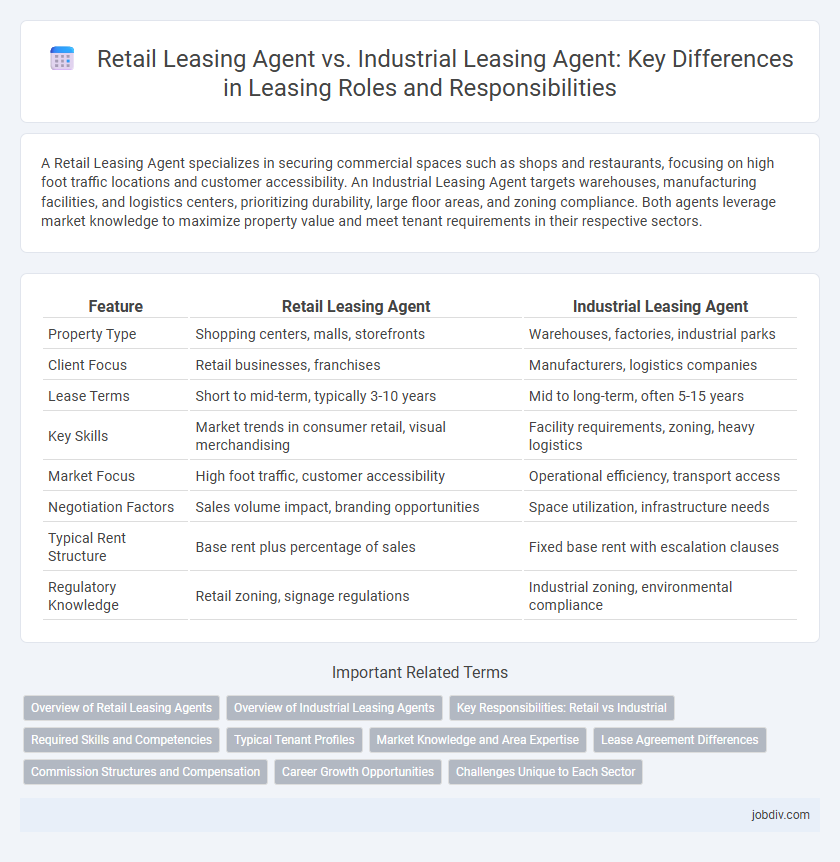A Retail Leasing Agent specializes in securing commercial spaces such as shops and restaurants, focusing on high foot traffic locations and customer accessibility. An Industrial Leasing Agent targets warehouses, manufacturing facilities, and logistics centers, prioritizing durability, large floor areas, and zoning compliance. Both agents leverage market knowledge to maximize property value and meet tenant requirements in their respective sectors.
Table of Comparison
| Feature | Retail Leasing Agent | Industrial Leasing Agent |
|---|---|---|
| Property Type | Shopping centers, malls, storefronts | Warehouses, factories, industrial parks |
| Client Focus | Retail businesses, franchises | Manufacturers, logistics companies |
| Lease Terms | Short to mid-term, typically 3-10 years | Mid to long-term, often 5-15 years |
| Key Skills | Market trends in consumer retail, visual merchandising | Facility requirements, zoning, heavy logistics |
| Market Focus | High foot traffic, customer accessibility | Operational efficiency, transport access |
| Negotiation Factors | Sales volume impact, branding opportunities | Space utilization, infrastructure needs |
| Typical Rent Structure | Base rent plus percentage of sales | Fixed base rent with escalation clauses |
| Regulatory Knowledge | Retail zoning, signage regulations | Industrial zoning, environmental compliance |
Overview of Retail Leasing Agents
Retail leasing agents specialize in securing and managing commercial spaces within shopping centers, malls, and high-street locations, targeting businesses such as boutiques, restaurants, and service providers. They possess in-depth knowledge of consumer foot traffic patterns, lease terms tailored to retail cycles, and the importance of storefront visibility to maximize tenant success. Retail leasing agents also navigate complex retail lease agreements, balancing landlord requirements with tenant profitability to foster long-term occupancy and retail growth.
Overview of Industrial Leasing Agents
Industrial leasing agents specialize in securing and managing leases for warehouses, manufacturing facilities, and distribution centers, optimizing space for industrial operations. They possess deep knowledge of zoning regulations, logistics requirements, and specialized infrastructure needs such as loading docks and heavy power supply. Their expertise supports businesses in maximizing operational efficiency and compliance within industrial real estate markets.
Key Responsibilities: Retail vs Industrial
Retail leasing agents focus on managing leasing activities for commercial spaces such as shopping centers, malls, and storefronts, emphasizing tenant relations, marketing retail properties, and negotiating lease terms tailored to consumer-facing businesses. Industrial leasing agents specialize in warehouses, manufacturing facilities, and distribution centers, concentrating on technical property evaluations, coordinating with logistics operators, and structuring leases that accommodate industrial operational needs. Both roles require market analysis and contract negotiation skills but differ in their property types, tenant industries, and specific lease structuring priorities.
Required Skills and Competencies
Retail leasing agents must excel in customer relationship management, negotiation, and market analysis specific to high-traffic consumer environments, emphasizing tenant mix and footfall optimization. Industrial leasing agents require strong knowledge of zoning laws, technical specifications of warehouses or manufacturing spaces, and an ability to assess logistical advantages and large-scale contract negotiations. Both roles demand expertise in lease agreements and property valuation but differ significantly in industry-specific knowledge and stakeholder interaction styles.
Typical Tenant Profiles
Retail leasing agents typically work with tenants such as boutique stores, restaurants, and service-oriented businesses seeking high foot traffic locations in shopping centers or urban retail districts. Industrial leasing agents focus on tenants like manufacturers, logistics companies, and warehouses requiring large spaces with access to transportation hubs and loading docks. Understanding these distinct tenant profiles helps leasing agents tailor property offerings and negotiate leases that meet specific operational needs.
Market Knowledge and Area Expertise
Retail leasing agents specialize in high-traffic commercial zones with deep understanding of consumer behavior and shopping trends essential for securing prime storefronts. Industrial leasing agents possess expertise in logistical hubs, distribution centers, and manufacturing zones, emphasizing knowledge of zoning regulations, transportation infrastructure, and facility specifications. Market knowledge in retail hinges on demographics and foot traffic analytics, whereas industrial leasing relies on insights into supply chain demands and operational efficiency.
Lease Agreement Differences
Retail leasing agents specialize in negotiating lease agreements tailored to storefronts and commercial spaces within shopping centers, emphasizing shorter lease terms, percentage rent clauses, and clauses for common area maintenance. Industrial leasing agents focus on lease agreements for warehouses and manufacturing facilities that often feature longer lease durations, triple net (NNN) leases where tenants bear property expenses, and provisions addressing heavy equipment use and zoning compliance. The lease agreement differences reflect the unique operational needs and risk profiles of retail versus industrial tenants.
Commission Structures and Compensation
Retail leasing agents typically earn commissions based on a percentage of the total lease value, often ranging from 3% to 6%, with compensation influenced by factors such as lease duration and tenant improvements. Industrial leasing agents may have a different commission structure, sometimes receiving a flat fee or a lower percentage, around 2% to 4%, reflecting longer lease terms and larger square footage. Both roles may include base salaries plus bonuses tied to lease renewals and tenant acquisition success, impacting overall compensation packages.
Career Growth Opportunities
Retail leasing agents often experience accelerated career growth due to higher transaction volumes and frequent client interactions within consumer-focused environments. Industrial leasing agents typically achieve steady advancement by specializing in complex lease negotiations and developing expertise in logistics and manufacturing sectors. Career progression in both roles benefits from building strong networks and deep market knowledge, with retail emphasizing customer service skills and industrial focusing on analytical and technical competencies.
Challenges Unique to Each Sector
Retail leasing agents navigate challenges such as high tenant turnover, evolving consumer trends, and the need to secure prime storefront locations that drive foot traffic and sales. Industrial leasing agents face unique obstacles including managing large-scale warehouses, addressing complex logistical requirements, and adapting to fluctuations in manufacturing and supply chain demands. Both sectors require specialized knowledge of market dynamics, but industrial leasing often entails longer lease terms and intricate contractual negotiations compared to the dynamic, consumer-driven retail environment.
Retail Leasing Agent vs Industrial Leasing Agent Infographic

 jobdiv.com
jobdiv.com